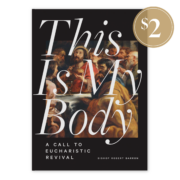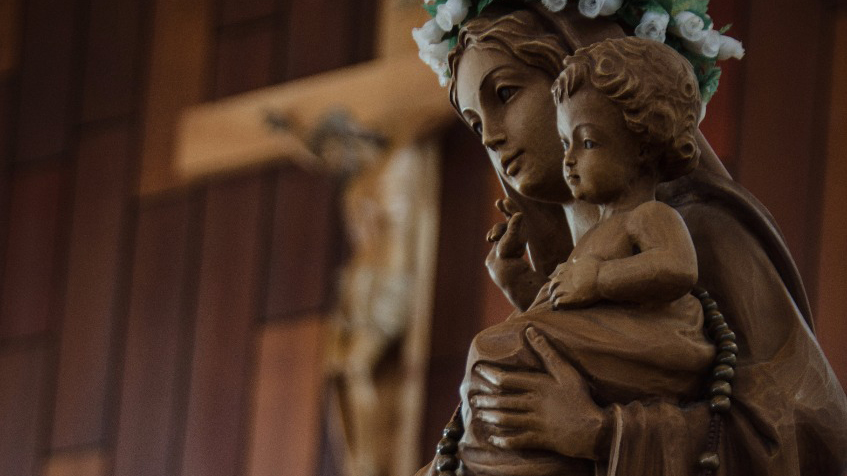Nearly twenty years ago, realizing that I was going to fall asleep before finishing my Rosary, I placed my half-prayed beads directly onto the nightstand, instead of in their plastic holder, and drifted off to slumber.
Upon awakening the next morning, I saw that the beads, though themselves dry, were sitting in a pool of dense, almost waxy-feeling oil.
The rosary had been an impulse-buy. It was hewn of rose-scented wooden beads and came in a case decorated with a kitschy illustration of St.Thérèse of Lisieux. Normally, I’d have taken a pass on such a purchase, but I’m a sucker for a rosy smell, and my late, lamented Catholic bookseller had cunningly stacked them near the register where people could linger and inhale and finally slip a scented rosary into their pile for just a few dollars more.
I give you these details only to emphasize how ordinary and un-special were both the rosary and my acquisition of it, and because later on, the scent will become important to the story.
I don’t question it. God can do anything . . .
Pondering the odd puddle, I touched the oil and rubbed it between my fingers, expecting to smell roses. Instead I smelled Church—the frankincense-heavy notes that wafted through my own parish each Monday at Adoration and during funerals and at high masses.
It was weird, but apparently not weird enough to impress me. I wiped the stuff away, placed the beads back on the wood, and thought no more of it.
The next morning, the rosary was again sitting dry amid a larger puddle of the same substance. This time, I collected it in a small glass container. Strangely enough, once I had collected the oil, the beads exuded no more. I kept what I had collected with no sense of why I might need it.
Not long afterwards, a twelve-year-old friend of our son’s suffered a stroke while playing sports. Days later, he was still in a coma, and local parents were taking turns visiting his hospital room to pray with the parents and talk to the boy in hopes of rousing him. There was never a response.
When it was our turn to visit, I felt nudged somehow into bringing the oil and also the rosary itself, in its case. With his parent’s permission, I used the oil to mark the boy’s forehead, hands, and feet with the sign of the cross. I explained to him what I was doing and related the story of how the oil had come about. No response.

Then, I opened the rosary container and lifted it to his nose.
His eyes shot open. All of us gasped. “Do that again,” his mother said.
I raised the rose-scented beads to his nose again and once more he opened his eyes. “This is the first time he’s done that,” his mother wept.
His eyes remained open. I raised the beads once more and this time—as he stared straight ahead—the boy snatched the case from my hands and held them near his nose. I gave him the lid and within minutes he was opening, sniffing, and closing the container—wordlessly opening, sniffing, and closing.
We didn’t stay long after that, but while we were there, our patient continued to open the rosary case, smell the beads, and close it. “You can keep the rosary,” I told the still-staring boy as we said goodbye. There was no way I was taking them from his hands.
Not very long after that, he was released from the hospital. He has since graduated from a prestigious university and is doing well.
So, was the oil miraculous? His parents thought so. I’m more inclined to think that the powerful scent of roses stimulated his olfactory senses and helped rouse him. But perhaps it was a necessary application of both.

I don’t question it. God can do anything and—as Scripture and the saints prove—he will often use the most unexceptional tools and people to work his will upon the world, even a dullard who finds chrism-scented oil beneath rose-scented wooden beads and is too intrigued to leave it uncollected.
Though I do think God probably had a design in all of that, I needn’t believe it if I don’t wish to. Private revelations are not part of the deposit of faith, after all—Catholics may believe in both these small “miracles” and the well-investigated spiritual phenomena that beget so many pilgrimages to Lourdes or Fatima, or they may ignore them entirely.
It’s a credit to the Church that we have a deep and thorough process of authenticating spiritual phenomena before proclaiming it “worthy of belief” or “unworthy.” So exacting is it that after 150 years of continuous pilgrimages (and countless healings of both a physical and spiritual nature), the Church only “officially” recognizes seventy physical healings from the spring waters at Massabielle. It is the insistence on investigation that gives these happenings credibility and protects the reputation of the Church.
